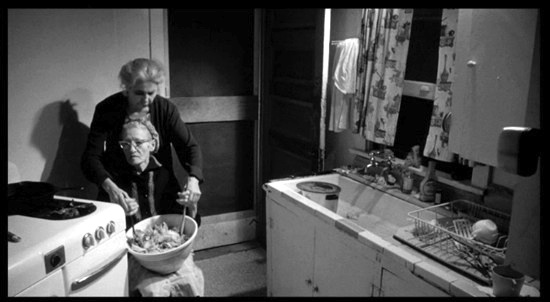Eraserhead

I first saw David Lynch’s Eraserhead in the early Eighties, at the Harvard Square Theatre. Replete with images of loneliness, tedium, and paranoia, the film portrays Henry (Jack Nance)’s life as pointless at best. At seventeen, I cheered aloud when, for what seemed like an hour, Henry’s elevator door wouldn’t close.
Twenty-six years later, though the Eraserhead moment I most cherish may be bleak, it isn’t nihilistic. Mrs. X (Jeanne Bates) plops a bowl of salad into the lap of Grandmother (Jean Lange). She puts Grandmother’s hands through the motions of mixing the ingredients, then puts a cigarette into Grandmother’s mouth and lights it. It’s a moving scene, which is why the unsentimental blocking — the catatonic widow-woman is shunted to the side of the frame, halfway behind the stove — is so effective.
Lynch has claimed, cryptically, that a single line from the Bible unlocks the movie’s meaning. Perhaps it’s this one, from Deuteronomy: “And the Levite, because he hath no part nor inheritance with thee, and the stranger, and the fatherless, and the widow, which are within thy gates, shall come, and shall eat and be satisfied.”

